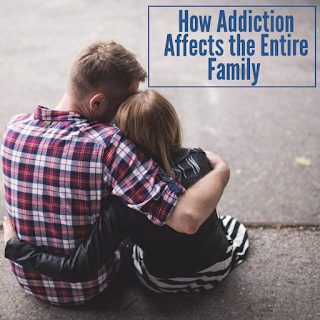
When one person in a family becomes addicted to drugs or alcohol, their substance abuse issue doesn’t exist in a bubble. It affects the entire family, causing a number of interpersonal problems. It’s not a stretch to say that addiction is a family disease, since it changes the relationships the family has with the addict and each other.
The Addicted Person Becomes Isolated from Rest of the Family
The person with a substance abuse problem will likely find that they are increasingly isolated from the rest of the family over time. As the addiction progresses, it becomes more difficult for the addict to keep up with work and family responsibilities. Over time, a person with an addiction will gain a reputation for being unreliable.
Someone with substance abuse issues is likely to make promises to family members and then break those promises. An addict may agree to stop using or seek help but fail to follow through. He or she may ask for financial help, food, or a place to stay, “Just this once” or “for the last time” but continue to ask the family for support.
If they start borrowing money from family members due to financial issues caused by their addiction and don’t pay it back, this type of behavior won’t bring them closer to family members. Instead, it will lead to resentment, conflict and further isolation within the family.
A Spouse or Partner of Addict May Become Codependent
An addict’s spouse or partner is living in a very close relationship with someone who is not in an emotionally healthy state. A person who is abusing drugs or alcohol is using chemicals as a coping mechanism. The family’s resources are being used to support the addiction, which may be creating or contributing to financial hardship.
The spouse could be experiencing some or all of the following as a result of living with someone who is an addict: denial, guilt, shame, anger, anxiety or hopelessness. When an addict’s spouse becomes the primary supporter and rescuer, they are in a codependent relationship.
This pattern isn’t healthy for either person. The helper-spouse’s self-esteem is caught up in helping to lower his or her spouse’s suffering. As a result, they enable the addict by “taking care” of them. This type of person is often very loyal, even if they have been let down multiple times.
Children with Addicted Parents
According to the National Institute on Drug Abuse, children who grow up with addicted parents are more likely to develop depression or anxiety and to begin using drugs or alcohol at an early age.
Children who grow up in a home where one or both parents have a substance abuse problem may develop skills necessary to deal with a higher level of stress than their peers. In the best cases, they grow up with good judgment, the ability to tolerate uncertainty, and the willingness to take on responsibility.
A child whose parent has a substance abuse issue will likely be overprotective of their parent. Even though the child may be well aware that the parent has a drug or alcohol problem, the child may feel that it is his or her duty to defend the parent to extended family members or anyone who may be critical. Taking on this enormous responsibility can cause great emotional stress for the child.
Someone who grows up in that type of stressful home environment may extend their need for hyper-vigilance toward their own children as an overprotective parent. They may have trouble allowing the child to become independent; instead, they become a controlling parent.
Addiction in Blended Families
As blended families become more common, more people with a substance abuse problem will be stepparents. Even in ideal circumstances, blending two families is challenging. The biological parents need to be able to communicate effectively on issues involving the children. Ideally, their new partners will feel included as part of the team.
When a stepparent has an issue with addiction, the children may have difficulty getting close to him or her. The children may be noticing signs of addiction (mood swings, difficulty paying attention, stepparent going out with new friends, missing money or household items), which can lead to extra stress in the home.
Children living in a blended family situation may feel as though they don’t have any control over their living arrangement. If a child doesn’t develop close ties to either biological parent or one of the stepparents, he or she may look to peers as substitutes. This situation can open the door to substance abuse for a young person who wants to fit in with their surrogate “family.”
A stepparent living in a household where a child (of any age) develops a substance abuse problem may not have very much patience with the situation. If the child is a minor, the stepparent may want the child to go live with the other biological parent. The stepparent may want adult children in this situation to move out of the family home. The biological parent may see the situation differently, and want the adult child or children to stay at home. This is not a situation that is easy to resolve, and it’s one where the biological parent is likely to feel they are being put in an impossible position.
Effects of Addiction on Extended Family
The effects of addiction can extend beyond the immediate family. Extended family members may feel also uncomfortable around the person who has a substance abuse issue due to their behavior. Depending on the occasion, these family members may feel embarrassed, ashamed, angry, concerned or even guilty when attending family functions where the addict is present.
By Jodee Redmond
 To learn more about programs offered at English Mountain Recovery, call and speak with someone today at (877) 615-8569. We are ready to help you or your loved one recover.
To learn more about programs offered at English Mountain Recovery, call and speak with someone today at (877) 615-8569. We are ready to help you or your loved one recover.Sources
NCBI: Impact of Substance Abuse on Families
Psychology Today: Are You In a Codependent Relationship: psychologytoday.com/blog/presence-mind/201307/are-you-in-codependent-relationship
Chicago Tribune: Effects of Substance Abuse on Families



